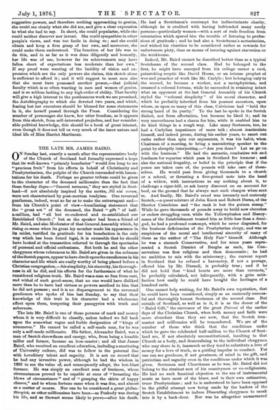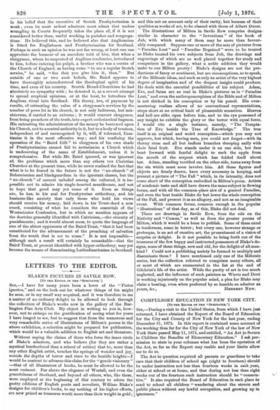THE LATE MR. JAMES BAIRD.
ON Sunday last, exactly a month after the representative body of the Church of Scotland had formally expressed a hope that, its. well-known "princely benefactor" would live long to see "precious fruit" from his efforts in behalf of Christianity and Presbyterianism, the pulpits of the Church resounded with lamen- tations for his death. Perhaps no greater tribute could be given to, the- character of the deceased millionaire: than the fact that these. Sunday doges-4' funeral sermons," they are styled in Scot- land—if not absolutely inspired by the motto, Ara nisi verum, w,ere•not characterised by post-mortem toadyism. One reverend gentleman, indeed, went so far as to make the extravagant and— from his Church's point of view—humiliating statement that the " great act " of the deceased, the Baird " gift " of half- a-million, had " all but re-endowed and re-established our Established Church ;" but, as the speaker had beans- friend of Mr. Baird, and also Moderator of that General Assembly which, by rising en masse when its great lay member made his appearance in its midst, testified its gratitude for his benefaction in the only way which has been, found legal, it is excusable that he should have looked at the transaction referred to through the spectacles of personal.and official enthusiasm. But both he, and the other clergymen whose references to Mr. Baird are given in the columns of theSooteh papers, appear to have.dwelt upon-the excellences in his character and life which are really worthy of being placed before a Christian congregation,—his simplicity, his sincerity, his thorough- ness in all he did; and his efforts for the furtherance of what he considered religious truth. Mr. Baird a man so free from cant, and withal of such good-sense, that no one would have disliked more than he to have had virtues or powers ascribed to him that he did not ,possess ; and it is no disparagement to the reverend gentlemen who spoke of him last Sunday, to say that their knowledge of this trait in his character had a wholesome effect upon them, tempering their panegyrics with truth and soberness.
The late Mr. Baird is one of those persons of mark and money whom it is very difficult to classify, unless indeed we fall back upon the somewhat vague and feeble designation of "kings of commerce." He cannot be called a self-made man, for he was only a self-made millionaire. His father, Alexander Baird, was a man of Seotch shrewdness and energy, who, from being a humble miller and farmer, became an iron-master ; and all that James Baird, who received an excellent education, including a smattering of University culture, did was to follow in the paternal line with hereditary talent and sagacity. It is not on record that he had' any inventive power, although he had the wisdom in T833' to see the value of, and consequently adopt, the hot-blast furnace. He was simply an excellent man of business, whom circumstances proved to be capable at once of " breasting the blows of circumstance and of " grasping the skirts of happy chance," and to whom fortune came when it was due, and almost as a matter of course. Nor can he be considered a great philan- thropist, as other millionaires have been—as Peabody was during his life, and as Stewart seems likely to prove—after his death.
He had a Scotchman's contempt for indiscriminate charity, although he is credited with having befriended many needy persons—particularly women—with a sort of rude freedom from ostentation which spared him the trouble of listening to profes- sions of gratitude ; and he had also a Scotchman's sectarianism, and wished his charities to be considered rather as rewards for unfortunate piety, than as means of insuring against starvation or the workhouse.
Indeed, Mr. Baird cannot be described better than as a typical Scotchman of the second class. Had he belonged to the first, he might have emerged from his college career a cool, painstaking sceptic like David Hume, or an intense prophet of woe and preacher of work like Mr. Carlyle ; but belonging only to the second, he became a worker, not a metaphysician, and amassed a colossal fortune, while he succeeded in retaining intact what an opponent at the last General Assembly of his Church styled the "colossal simplicity" of his moral character, and which he probably inherited from his peasant ancestors, upon whom, as upon so many of this class, Calvinism had "held the
strong hand of its purity." To the last he spoke in the Scotch dialect, not from affectation, but because he liked it ; and its very uncouthness had a charm for him, while it enabled him to do kind things in a rough way. Like many Scotsmen, too, he had a Carlylian impatience of mere talk ; almost inarticulate himself, and indeed prone, during his earlier years,. to snort onto oaths rather than spin out arguments, it was his habit, when Chairman of a meeting, to bring a maundering speaker to the. point by abruptly interjecting,—"Are you done? Let us go cm.
with the business." He had the sarcastic, combative wit and fondness for repartee which pass in Scotland' for humour ; and also the national frugality, or belief in the principle that if the pence are taken care of, the pounds will take care of them- selves. He would pass from giving thousands to a church or a school, or thrusting a five-pound note into the hand of a widow, with instructions to say nothing about it, to challenge a cigar-bill, or ask heavy discount on an account for beef, on the ground that he always met such charges when sent in. And finally, Mr. Baird's creed was intensely and curiously Scotch,—a queer mixture of John Knox and Robert Burns, of the Shorter Catechism and "the rank is but the guinea stamp." While he gave thousands of pounds away to build new churches or endow struggling ones, while the Yellowplushes and Honey mans of the Establishment treated him as little less than a demi- god, he had a profound oomtempt, which he never disguised, for
the business deficiencies of the Presbyterian clergy, and was as suspicious of the moral and intellectual sincerity of many of them an the author of "The Holy Fair" himself. Although he was a staunch Conservative, and for some years repre-.
rented a Scotch District of Burghs as such, his Con- servatism was first religious and then democratic ; he had no ambition to mix with the aristocracy ; the current report in Scotland that he refused a baronetcy, if not a peerage, offered him by Mr. Disraeli, is probably true ; and if he did not hold that " kind hearts are more than coronets," he probably calculated, not infrequently, with a grim satis- faction how easily he could have bought the heritages of a hundred earls.
One cannot help wishing, for Mr. Baird's own reputation, that he could have been considered, simply as an eminently success- ful and thoroughly honest Scotsman of the second class. But
outside of Scotland, as well as in it, it is as the donor of the " Baird Gift," the successor of the great Patroni of the earlier
days of the Christian Church, when both money and faith were
more abundant than they are now, that the Scotch iron- master and millionaire will be remembered. We are of the
number of those who think that the conditions under which he gave the celebrated half-million to the Church of Scot- land are, if not absolutely unconstitutional, insulting to that Church as a body, and demoralising to the individual clergymen who may share in it, inasmuch as they tend to substitute a love of money for a love of truth, as a guiding impulse to conduct. Yet one can see goodness, if not greatness, of mind in the gift, and patriotism and sagacity even in the conditions under which it was given. Scotsman and Churchman as he was, Mr. Baird did not belong to the straite,st sect of his countrymen or co-religionists. He had no such fanatical objection to the use of instrumental music as have most of the bluer, and in their own estimation, truer Presbyterians ; and he is understood to have been-opposed to the pitiful attempt now being made by the leaders of the Scotch Establishment to induce Dissenting clergymen to sneak into it by a back-door. Nor was he altogether unwarranted in his belief that the executive of Scotch Presbyterianism is weak ; even its most ardent admirers must admit that useless Wrangling in Courts frequently takes the place of, if it is not considered better than, useful working in parishes and congrega- tions. He believed this, and he believed also that Anglicanism is fitted for Englishmen and Presbyterianism for Scotland. Perhaps in such an opinion he was not far wrong, at least one can appreciate the humour of an anecdote told of him, that when a clergyman, whom be suspected of Anglican tendencies, introduced to him, before entering his pulpit, a brother who was a curate of the Church of England, as having come " to see a regular Scotch service," he said, "See that you give him it, then." But outside of one or two such beliefs, Mr. Baird appears to have thoroughly misunderstood the theological spirit of his time, and even of his country. Scotch Broad-Churchism he had absolutely no sympathy with ; he detested it, as a covert attempt to spread sceptical opinions, or at the least, to introduce the Anglican ritual into Scotland. His theory, too, of payment by results, of estimating the value of a clergyman's services by the number of pews let in his church, is not only ludicrous, but mis- chievous, if carried to an extreme ; it would convert clergymen, from being preachers of the truth, into expert ecclesiastical bagmen. His entrusting the administration of the money he bestowed upon his Church, not to a central authority in it, but to a body of trustees, independent of and unrecognised by it, will, if tolerated, Eras- tianise it in the most offensive way ; and his confining the operation of the " Baird Gift" to clergymen of his own shade of Presbyterianism cannot fail to sectarianise a Church which is undeserving of the name of Establishment, unless it is comprehensive. But while Mr. Baird ignored, or was ignorant of, the problems which more than any others vex Christian Churches at the present time, while he never realised the fact that what is to be feared in the future is not the " no-church " of Bohemianism and blackguardism in the ignorant classes, but the " no-church " of earnest unbelief among the cultured, it is im- possible not to admire his single-hearted munificence, and not to hope that good may yet come of it. Even as things are, he has, in his zeal for Presbyterian orthodoxy, and his business-like anxiety that only those who hold his views should receive his money, laid down in his Trust-deed a new creed, consisting of what he considers the essentials of the Westminster Confession, but in which no mention appears of the doctrine generally identified with Calvinism,—the eternity of punishments ; and it would almost seem, to quote the language of one of the ablest opponents of the Baird Trust, "that it had been constituted for the advancement of the preaching of salvation from the wrath that is not to come." It is not impossible— although such a result will certainly be remarkable—that the Baird Trust, at present identified with hyper-orthodoxy, may yet become the means of disseminating Latitudinarianism in Scotland.



































 Previous page
Previous page